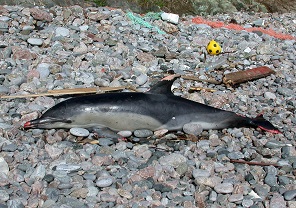There are many different sources of chemical pollution, including industrial waste, domestic sewage, atmospheric fallout, domestic and agricultural run-off and operational or accidental discharges. Estuaries and some other coastal waters may show signs of eutrophication and are sometimes significantly contaminated with hazardous substances, such as persistent organic pollutants (POPs) and heavy metals. In addition to direct poisoning, chronic exposure to low amounts of toxic substances can cause significant impacts on health.
Some chemical pollutants like POPs and mercury accumulate in tissues of living organisms and biomagnify, reaching highest concentrations in tissues of animals at the top of the food chain. Cetaceans feed at a high trophic level and are particularly vulnerable to contaminant-related adverse health effects due to chronic exposure. Reduced reproductive health, increased susceptibility to disease, appearance of lesions and tumours, and increased incidence of developmental abnormalities, have been observed in contaminated marine mammal populations around the world.
The concentrations of organochlorines show a declining trend in European waters due to imposed bans and changes in technology. However, new toxic contaminants like polybrominated diphenylethers are being produced and are finding their way into the marine environment. Marine pollution remains a serious threat for which an international, coordinated approach is still needed.

Another cause for concern is the worldwide increase of marine debris. The significance of plastic debris for cetaceans is unclear, however. For example, findings from the UK’s 20-year strandings scheme did not indicate that marine debris was a major problem (see AC18 Report). In order to better assess whether this is a cause for concern, the ASCOBANS Advisory Committee agreed to look into the matter at its 19th Meeting in 2012, for which a background document summarizing the state of knowledge of the impact on cetaceans of marine debris (including ingested plastics) will be prepared.
The Advisory Committee to ASCOBANS has a standing Pollution Working Group, which compiles annually an overview of relevant scientific articles addressing the effects of pollution on cetaceans (see Reports of the Advisory Committees, accessible here). Articles of key importance are especially drawn to the attention of the Parties.
In March 2011, a joint Workshop on Pollution and Marine Mammals was convened by ASCOBANS, ACCOBAMS and the European Cetacean Society. A brief preliminary report can be accessed here; full proceedings including recommendations to Parties are under development.
ASCOBANS also seeks to cooperate with other organizations addressing this issue, such as ICES (see e.g. the Working Group on Marine Mammal Ecology) the EU, OSPAR and HELCOM, and makes information and recommendations available to Parties. The Agreement also funds pollution-related research when possible.


